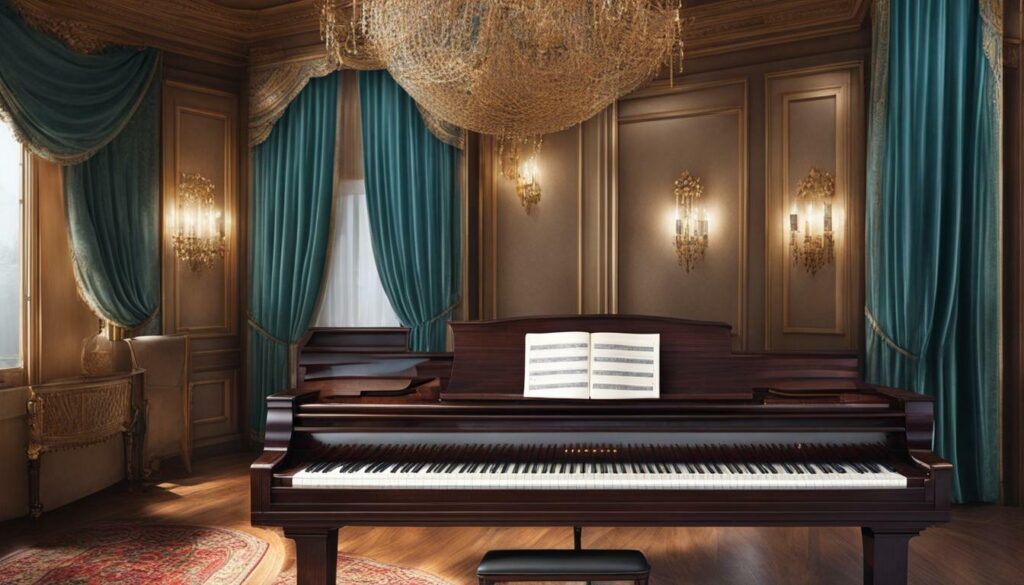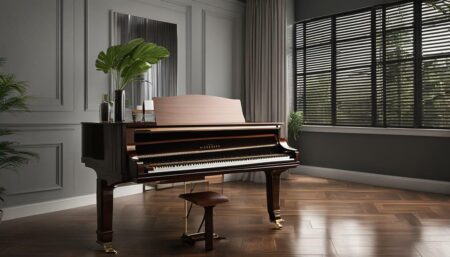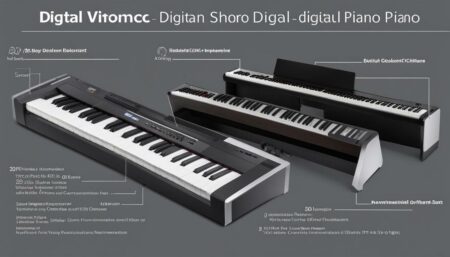Digital pianos have come a long way in replicating the sound of real pianos, but how close do they actually come? With advancements in technology, digital pianos now offer a range of sounds and customizable features that can closely mimic the rich tones of acoustic pianos. Let’s explore the world of digital piano sound quality and see how they compare to their traditional counterparts.
- Digital pianos use electronic circuitry and recorded samples to recreate the sound of acoustic pianos.
- Modern digital pianos can reproduce piano samples with incredible detail and offer a wide variety of sounds.
- Weighted keys in digital pianos mimic the feel of acoustic pianos for a more authentic playing experience.
- Digital pianos can be connected to headphones or external speakers, providing unlimited playing time and volume control.
- While digital pianos are more compact and portable, acoustic pianos have a timeless design and physical vibrations that create a unique connection with the player.
When it comes to choosing between a digital piano and an acoustic piano, it ultimately depends on personal preferences and needs. Digital pianos can closely resemble acoustic pianos in terms of sound and feel, offering convenience and versatility. However, acoustic pianos have an essence of beauty, history, and a genuine tone that some players find irreplaceable. Consider your preferences, the level of maintenance you want, and the overall playing experience you desire before making your decision.
Understanding the technology behind digital piano sound quality
The sound quality of digital pianos is achieved through a combination of cutting-edge technology and meticulous sampling. These instruments utilize electronic circuitry and recorded samples to recreate the rich tones of acoustic pianos with remarkable accuracy. By capturing the nuances of each individual note, digital pianos are able to produce a high-quality sound that rivals that of traditional pianos.
One of the key technologies used in digital pianos is advanced sampling. This involves recording and storing the sounds produced by real acoustic pianos, capturing every subtle detail and characteristic. These samples are then carefully selected and integrated into the digital piano’s sound library. The result is a wide range of authentic piano sounds that can be accessed at the touch of a button.
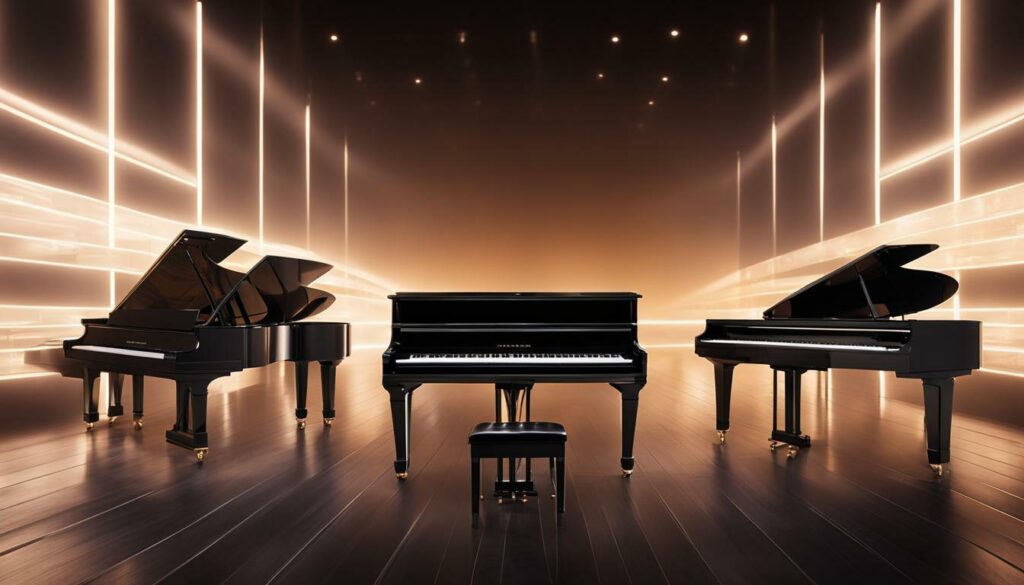
Additionally, digital pianos often feature weighted keys that mimic the feel of acoustic piano keys. These keys are designed to offer a similar level of resistance and response, allowing pianists to express themselves with the same level of control and precision. The combination of realistic sound samples and weighted keys contributes to the overall premium sound quality of digital pianos.
In summary, digital pianos achieve their high-quality sound through a combination of advanced technology and meticulous sampling. From the electronic circuitry to the sound libraries and weighted keys, every element is carefully designed to replicate the sound and feel of an acoustic piano. Whether you are a professional pianist or a beginner, digital pianos offer a convenient and versatile option without compromising on sound quality.
The evolution of digital piano sound quality
In recent years, digital piano manufacturers have made significant strides in delivering exceptional sound quality that rivals that of traditional acoustic pianos. Through advancements in sampling techniques and the incorporation of high-quality sound libraries, modern digital pianos can now reproduce piano samples with incredible detail. These improvements have led to a surge in digital piano popularity, attracting both professional musicians and enthusiasts alike.
One of the key factors contributing to the improved sound quality of digital pianos is the use of advanced electronic circuitry. This technology allows for more accurate sound reproduction, capturing the nuances and dynamics of a real acoustic piano. Additionally, the inclusion of premium sound samples, recorded from high-end acoustic pianos, further enhances the authenticity of the digital piano sound.
To achieve a more realistic playing experience, digital pianos also incorporate weighted keys. These keys mimic the feel of acoustic piano keys, providing a similar touch and response. The combination of weighted keys and advanced sound technology creates a more immersive playing experience, making it difficult to distinguish between a digital piano and an acoustic piano in terms of sound and feel.
Moreover, customizable features and sound options have greatly contributed to the evolution of digital piano sound quality. Digital pianos offer a wide range of sound choices, including various piano and organ sounds. With the ability to customize and tweak these sounds, musicians have the flexibility to achieve their desired tone. This level of control allows for unparalleled sound quality and versatility, making digital pianos a preferred choice for many musicians.
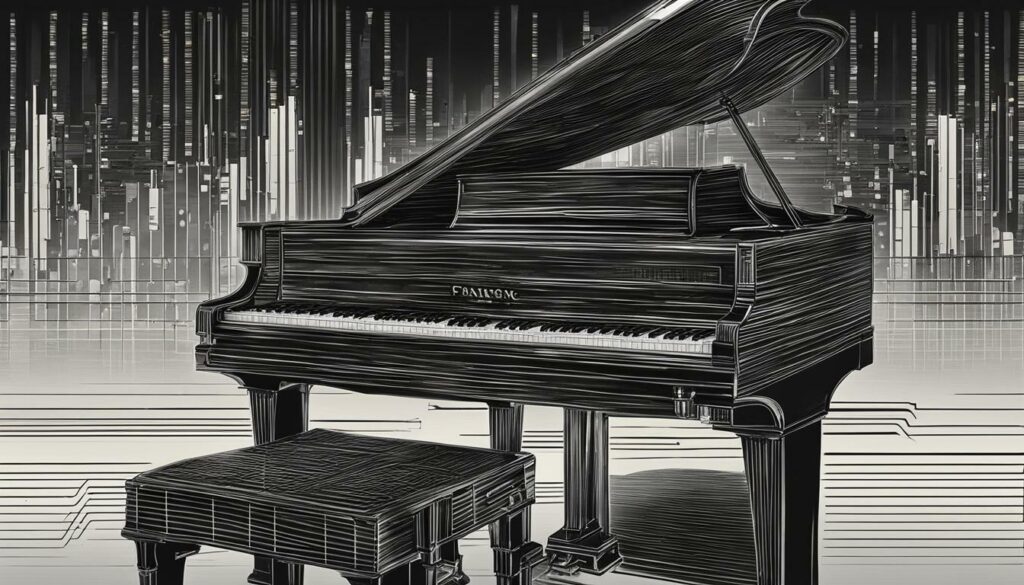
In conclusion, the evolution of digital piano sound quality has been remarkable. Through technological advancements and a focus on replicating the rich tones of acoustic pianos, digital pianos have become a viable alternative to their traditional counterparts. While acoustic pianos offer a timeless design and a genuine connection between the player and the instrument, digital pianos offer convenience, portability, and the ability to produce a high-quality sound. Ultimately, the choice between digital and acoustic pianos comes down to personal preferences and needs, but the advancements in digital piano sound quality have certainly made them a force to be reckoned with in the music industry.
The Role of Weighted Keys in Digital Pianos
Weighted keys are a crucial component of digital pianos, as they replicate the feel and responsiveness of traditional piano keys. When you press a key on an acoustic piano, you can feel the resistance and weight of the key, which adds to the overall playing experience and allows for precise control over dynamics. In digital pianos, weighted keys use a mechanism that simulates the resistance of acoustic piano keys, allowing pianists to achieve an authentic playing experience.
This attention to detail in the design of weighted keys contributes to the production of crystal clear digital piano sound. By mimicking the feel of acoustic piano keys, digital pianos offer a more authentic playing experience, allowing pianists to express themselves fully through their music. Whether you’re playing a soft, delicate passage or a powerful, dynamic section, the weighted keys of a digital piano ensure that you can achieve the desired result.
Moreover, the use of weighted keys in digital pianos enhances the overall sound quality, as it provides pianists with better control over the instrument. The sensitive response of weighted keys allows for subtle nuances and delicate phrasing, resulting in a more expressive and nuanced performance. This combination of precise control and realistic feel enables digital pianos to produce an authentic sound that closely resembles that of an acoustic piano.
| Advantages of Weighted Keys in Digital Pianos |
|---|
| Replicate the feel and responsiveness of traditional piano keys |
| Enhance overall sound quality |
| Allow for precise control over dynamics |
| Enable pianists to achieve an authentic playing experience |
Weighted keys in digital pianos ensure that pianists can experience the familiar touch and control of an acoustic piano, resulting in an authentic playing experience and crystal clear digital piano sound. The attention to detail in the design and construction of weighted keys allows for precise control over dynamics and enhances the overall sound quality. With weighted keys, digital pianos can closely replicate the feel and responsiveness of traditional piano keys, providing pianists with an instrument that feels and sounds like the real thing.
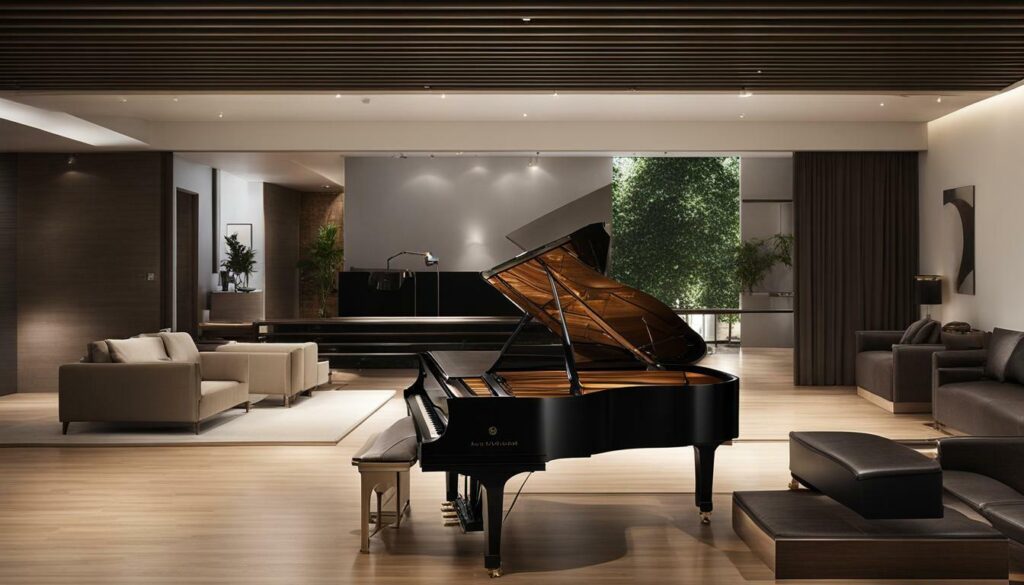
Customizable features and sound options in digital pianos
Digital pianos offer a wide range of sound options, allowing musicians to customize their playing experience and achieve the desired sound quality. Whether you’re a classical pianist looking for a grand piano sound or a jazz enthusiast looking for a vintage electric piano tone, digital pianos have got you covered.
One of the great advantages of digital pianos is their ability to provide a variety of piano and organ sounds. With just a few button presses, you can switch between different piano models, such as a bright and lively concert grand or a warm and mellow upright piano. Additionally, digital pianos often come with a range of non-piano sounds, including strings, brass, and synthesizers, allowing you to experiment and create unique musical textures.
Moreover, digital pianos usually come equipped with features that allow you to fine-tune the sound to your liking. You can adjust parameters such as reverb, chorus, and EQ settings to enhance the sound and create the perfect ambiance for your playing. Some digital pianos even offer the ability to record and layer different sounds, enabling you to create complex and immersive compositions.
Comparison table of customizable features in digital pianos
| Feature | Description |
|---|---|
| Sound presets | Choose from a wide variety of preset piano and organ sounds. |
| Effects | Adjust reverb, chorus, and other effects for added depth and richness. |
| Layering | Combine multiple sounds to create unique and layered compositions. |
| Recording | Record your performances for playback or further editing. |
| Connectivity | Connect your digital piano to a computer or external audio devices for expanded sound options. |
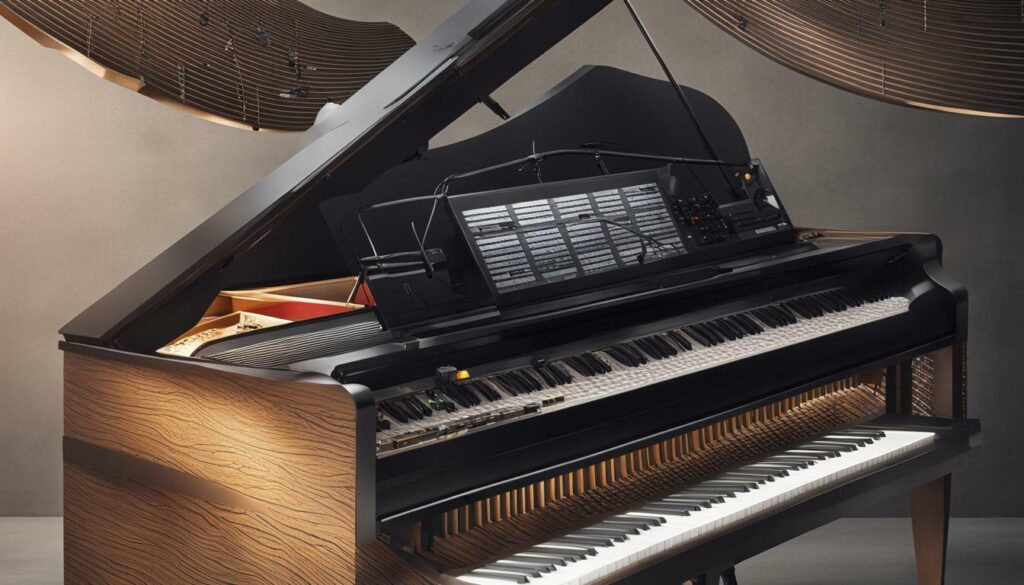
With all these customizable features and sound options, digital pianos provide endless possibilities for musicians to explore and express their creativity. Whether you’re a beginner or a seasoned player, the flexibility and versatility of digital pianos make them an excellent choice for achieving top-notch sound quality.
Digital pianos and audio options
Digital pianos provide convenient audio options that allow musicians to enjoy premium sound quality in various settings. Whether practicing at home, performing on stage, or recording in a studio, digital pianos offer flexibility and versatility to meet the needs of every musician.
One of the key audio options available in digital pianos is headphone connectivity. This feature allows players to practice and play without disturbing others, making it ideal for late-night sessions or shared living spaces. Additionally, using headphones can provide a more immersive experience by blocking out external distractions, allowing musicians to fully focus on their playing.
For those looking to perform or share their music with a larger audience, digital pianos offer the ability to connect to external speakers. This allows for a more powerful and dynamic sound, filling the room with rich tones and ensuring that every nuance of the performance is heard. Whether playing in a small venue or a concert hall, digital pianos can deliver a professional-grade sound experience.
| Audio Option | Benefits |
|---|---|
| Headphone Connectivity | – Practice without disturbing others – Immersive playing experience |
| External Speaker Connectivity | – Powerful and dynamic sound – Ideal for performances |
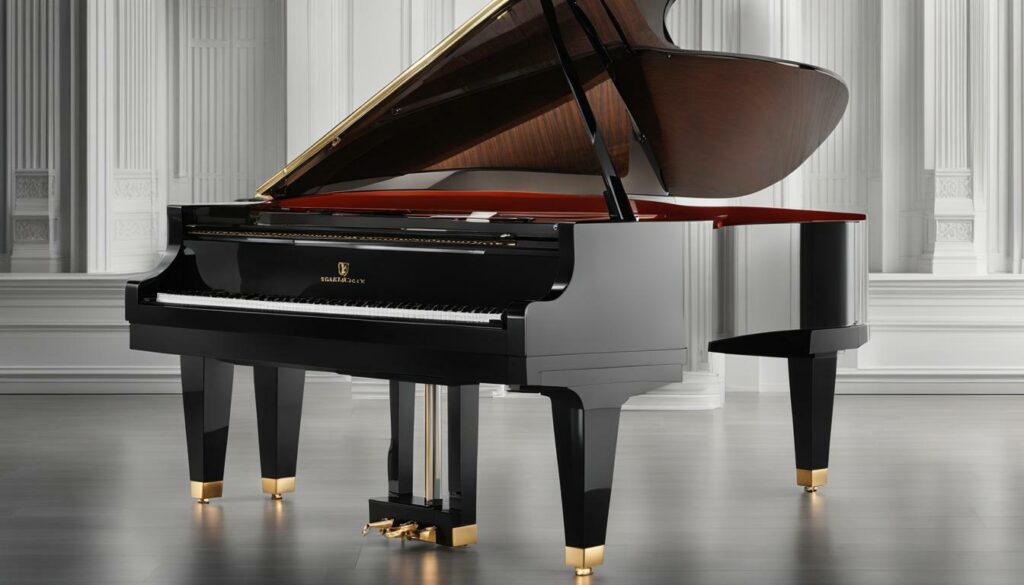
“Digital pianos provide convenient audio options that allow musicians to enjoy premium sound quality in various settings.”
By combining these audio options with the high-quality sound produced by digital pianos, musicians can achieve an exceptional playing experience. The realistic sound reproduction, combined with the ability to control volume and tone, ensures that every performance is delivered with precision and clarity.
Furthermore, digital pianos often come equipped with a range of sound customization features. Musicians can select different piano sounds that suit their musical style or experiment with organ or other instrument tones. This versatility allows for endless creativity and exploration, allowing musicians to tailor their sound to their unique preferences.
Whether playing at home or on stage, digital pianos offer the convenience and audio options needed to deliver a premium sound experience. With headphone connectivity for private practice and the ability to connect to external speakers for larger performances, digital pianos provide musicians with the freedom to express themselves and enjoy exceptional sound quality in any setting.
Portability and convenience of digital pianos
Digital pianos offer musicians the flexibility of high-quality sound in a portable and convenient package. Whether you’re a professional pianist on the go or a student attending music lessons, the compact design of digital pianos makes them easy to transport and set up wherever you want to play.
With their lightweight construction and sleek profiles, digital pianos are perfect for gigs, rehearsals, and even home practice. Unlike acoustic pianos, which can be bulky and require professional movers to transport, digital pianos can easily fit into smaller spaces and be carried by a single person.
Additionally, digital pianos can be played silently with the use of headphones, which is ideal for late-night practice sessions or shared living spaces. This allows you to practice without disturbing others while still enjoying the high-quality sound and authentic feel of a piano.
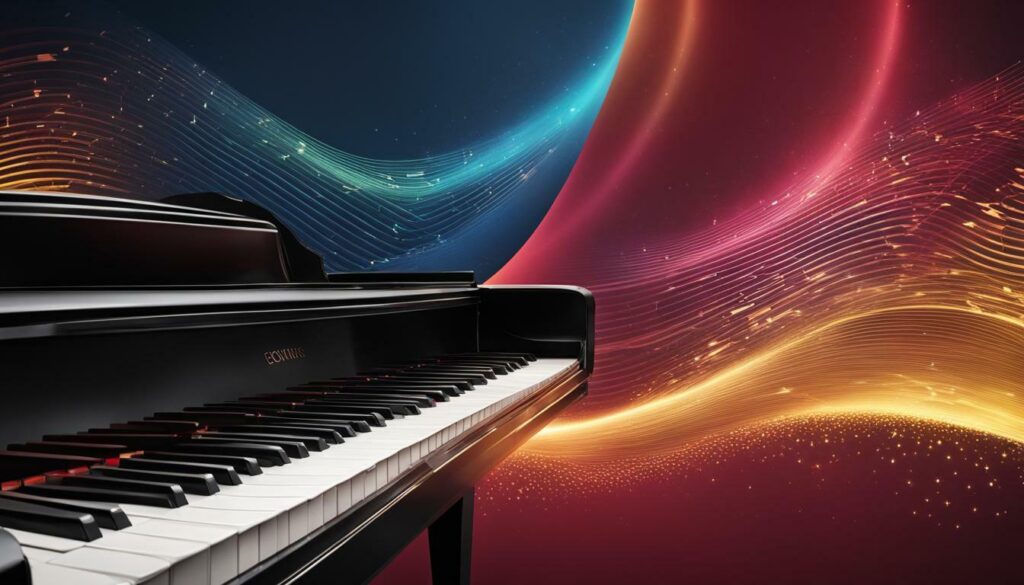
The convenience of digital pianos doesn’t end there. Here are some other features that add to their portability:
- Power options: Digital pianos can be powered by electricity or batteries, giving you the freedom to play even in outdoor settings or when there’s no power outlet available.
- Easy storage: When not in use, digital pianos can be folded up or placed in a compact stand, allowing you to save space in your home or studio.
- Recording capabilities: Many digital pianos come with built-in recording features, allowing you to capture your performances and easily share them with others.
While acoustic pianos have their own unique charm and appeal, the portability and convenience offered by digital pianos make them a popular choice for musicians of all levels. Whether you’re a professional seeking a versatile instrument for performances or a beginner looking for a compact and easy-to-use piano, digital pianos provide high-quality sound without compromising on convenience.
| Advantages of Digital Pianos | Advantages of Acoustic Pianos |
|---|---|
| Portability | Timeless design |
| Easy storage | Genuine tone |
| Headphone connectivity | Physical vibrations |
| Recording capabilities | Historical and aesthetic appeal |
Ultimately, the choice between a digital piano and an acoustic piano depends on your personal preferences, lifestyle, and musical needs. Both instruments have their own advantages, and the decision should be based on what suits you best. Whether you opt for the portability and convenience of a digital piano or the timeless beauty of an acoustic piano, the most important thing is to enjoy playing and creating music.
The enduring appeal of acoustic pianos
While digital pianos can closely replicate the sound quality of acoustic pianos, there are certain aspects of the acoustic piano experience that cannot be replicated. Acoustic pianos have a timeless design, genuine tone, and physical vibrations that create a unique connection between the player and the instrument. The essence of beauty and history that resonates from an acoustic piano is truly irreplaceable.
When playing an acoustic piano, every touch of the keys produces a distinct sound and response. The keys have a certain weight and responsiveness that cannot be replicated by digital pianos. The vibrations that travel through the body of an acoustic piano create a full-bodied resonance that adds depth and character to the sound. This physical interaction with the instrument allows musicians to express themselves with a level of nuance and sensitivity that is unparalleled.
Additionally, acoustic pianos provide a visual and tactile experience that cannot be replicated by their digital counterparts. The craftsmanship and intricate details of an acoustic piano, from the elegant curves of the cabinet to the smooth texture of the keys, add to the overall aesthetic appeal. The presence of an acoustic piano in a room creates a statement and serves as a beautiful centerpiece.
That being said, acoustic pianos do require regular tuning and maintenance to ensure optimal performance and sound quality. The delicacy of the strings and hammers can be affected by changes in temperature and humidity, necessitating professional care. Digital pianos, on the other hand, offer low maintenance needs and consistent sound quality over time.
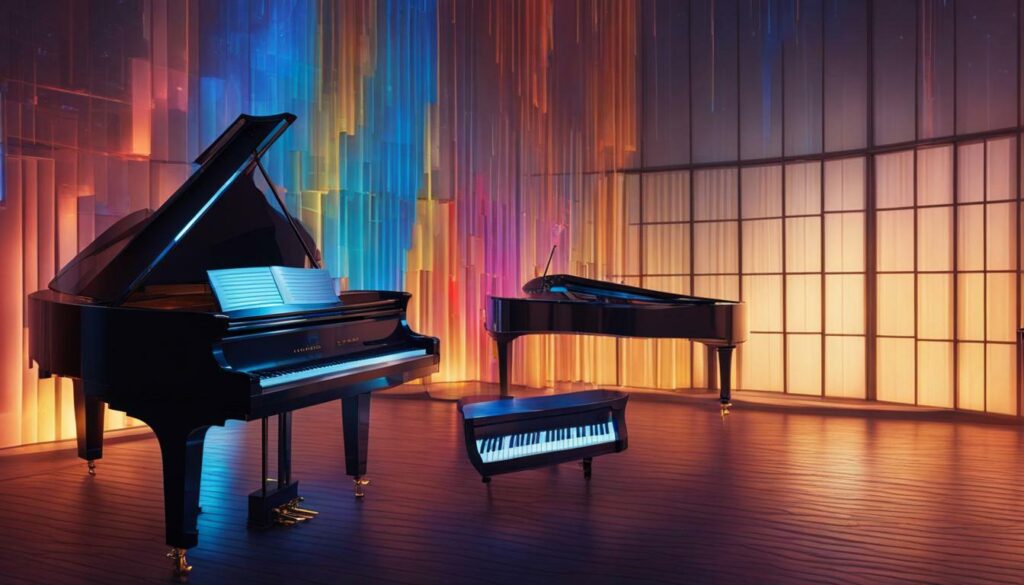
| Acoustic Pianos | Digital Pianos |
|---|---|
| Timeless design | Compact and portable |
| Authentic tone | Wide variety of sounds |
| Physical vibrations | Customizable features |
| Requires tuning and maintenance | Low maintenance needs |
In conclusion, while digital pianos have made significant advancements in replicating the sound quality of acoustic pianos, the enduring appeal of acoustic pianos lies in their timeless design, genuine tone, physical vibrations, and overall aesthetic presence. Both digital and acoustic pianos have their own merits and choosing the right piano ultimately depends on personal preferences, needs, and the desired piano playing experience.
Maintenance and Tuning Considerations
Acoustic pianos require regular tuning and maintenance to maintain optimal sound quality, whereas digital pianos are virtually maintenance-free. Traditional pianos, with their complex mechanisms and natural materials, are susceptible to changes in temperature and humidity, which can affect the tension of the strings and cause the piano to go out of tune. To keep an acoustic piano sounding its best, it is recommended to have it tuned at least once or twice a year by a professional piano technician. This ensures that the instrument produces the correct pitch and harmonies, allowing for a rich and accurate sound.
Additionally, acoustic pianos may require additional maintenance, such as voicing and regulation, to ensure that the keys respond uniformly and the tone is consistent across the entire keyboard. These adjustments are necessary to achieve an optimal playing experience, especially for advanced pianists who require precision and control.
On the other hand, digital pianos do not require regular tuning or complex maintenance. The electronic circuitry and recorded samples used in digital pianos allow for stable and consistent sound quality without the need for adjustments. However, it is still important to keep the instrument clean and free from dust and debris to maintain its longevity and prevent any issues with the keys or internal components. Regular cleaning with a soft cloth and, if necessary, a mild cleaning solution is sufficient to keep a digital piano in good condition.

“Acoustic pianos require regular tuning and maintenance to maintain optimal sound quality, whereas digital pianos are virtually maintenance-free.”
In summary, while the sound quality of an acoustic piano can be affected by environmental factors and requires regular tuning and maintenance, digital pianos offer a convenient and low-maintenance alternative. Both options have their advantages and drawbacks, and the choice between an acoustic and digital piano ultimately depends on personal preferences, budget, and specific needs. Whether it’s the timeless elegance of an acoustic piano or the versatility and convenience of a digital instrument, both can provide a satisfying musical experience.
Personal preferences and choosing the right piano
When choosing between digital and acoustic pianos, it’s important to consider your individual preferences and what aspects of sound quality and experience matter most to you. Both options have their own unique qualities and advantages, so finding the right piano ultimately depends on your personal needs and desires.
For those seeking convenience and versatility, digital pianos offer a wide range of sound options and customizable features. With different piano and organ sounds available, you can easily experiment and find the perfect tone for your style of playing. Additionally, digital pianos often have weighted keys that simulate the feel of acoustic piano keys, allowing for a more authentic playing experience.
On the other hand, acoustic pianos possess a timeless appeal that cannot be replicated. The genuine tone, physical vibrations, and aesthetic beauty of an acoustic piano create a unique connection between the player and the instrument. The rich history and tradition associated with acoustic pianos add to their allure, making them a favorite among many pianists.
It’s also important to consider practical factors such as maintenance and tuning. Acoustic pianos require regular tuning and maintenance to ensure optimal sound quality, while digital pianos are virtually maintenance-free. This difference can impact the longevity and consistency of sound over time.
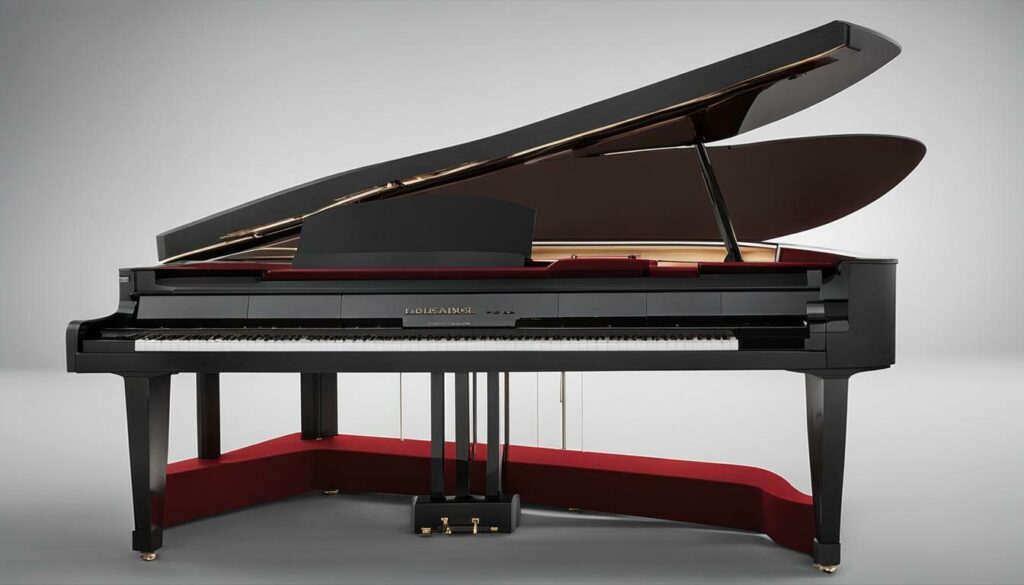
Ultimately, the choice between digital and acoustic pianos comes down to personal preference. If you prioritize versatility, portability, and the ability to easily experiment with different sounds and features, a digital piano may be the perfect fit for you. But if you value the timeless design, genuine tone, and physical connection that only an acoustic piano can provide, then investing in an acoustic piano may be the best choice for your musical journey.
Conclusion
In the debate between digital piano sound quality and acoustic pianos, both options have their merits, and the ultimate decision should be based on personal preferences and needs.
Factual data supports the notion that digital pianos aim to replicate the sound and feel of acoustic pianos using electronic circuitry and recorded samples. With advancements in technology, modern digital pianos can reproduce piano samples with incredible detail, offering a wide range of sounds and customizable features. The incorporation of weighted keys in digital pianos successfully mimics the feel of acoustic piano keys, creating a more authentic playing experience.
Furthermore, digital pianos offer convenient features such as headphone connectivity and the ability to connect to external speakers, allowing for unlimited playing time and volume control. They are also more compact and portable than their acoustic counterparts, making them a practical choice for those on the move.
On the other hand, acoustic pianos have an enduring appeal that cannot be replicated. Their timeless design, genuine tone, and physical vibrations create a unique connection between the player and the instrument. Acoustic pianos also possess a rich historical and aesthetic allure, adding a touch of elegance to any space.
It is important to note that acoustic pianos require regular tuning and maintenance to maintain their sound quality, while digital pianos require little to no maintenance. Ultimately, the choice between digital piano sound quality and acoustic pianos comes down to personal preferences and needs. Whether one seeks the convenience and versatility of a digital piano or the essence of tradition and beauty that accompanies an acoustic piano, both options can deliver satisfying musical experiences.



